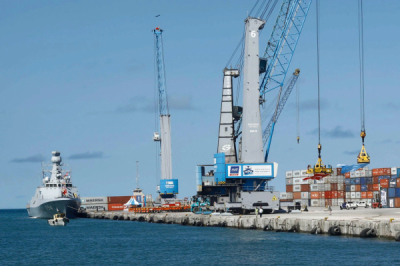
Tech (1143)
- Government launches a free digital platform for all Official Journal editions.
- The portal offers authenticated laws, decrees, and regulations since 1959.
- The project supports wider digital reforms under the World Bank–funded WARDIP.
The Mauritanian government inaugurated on Monday, November 24, a new digital portal dedicated to the Official Journal, now freely accessible to the public. The initiative aims to modernize access to legal texts, strengthen transparency in public information, and simplify consultation of laws in force, gathering more than 30,000 authenticated legislative and regulatory documents.
The portal centralizes all editions of the Official Journal since 1959, along with a selection of laws, decrees, international conventions, and other regulatory texts. Available in Arabic and French, it features an advanced search engine that allows legal professionals, investors, researchers, public administrations, and citizens to access authenticated and updated versions quickly.
The Official Journal is the primary legal source confirming the existence, entry into force, and authenticity of state-issued texts. Its digitization responds to the growing need to modernize procedures, reduce publication delays, and ensure easier access to legal information in a context of rapid digital transformation.
The project is part of the West Africa Regional Digital Integration Program (WARDIP – Mauritania), financed by the World Bank, which supports the country’s administrative modernization. It also includes a training program for staff at the General Secretariat of the Government, covering digital archiving, legal database management, and code updates to ensure the platform’s reliability and long-term sustainability.
Beyond the digitization of the Official Journal, WARDIP also plans the creation of a public-service interoperability framework, the development of a government cloud, improvements in broadband access, and support for innovation and start-ups. These actions aim to create an environment conducive to digital public services and economic development.
The launch of the Official Journal portal is expected to improve access to law for citizens and courts, strengthen public-sector transparency, secure the regulatory environment for investors, and consolidate the rule of law. With more than 30,000 authenticated texts covering over six decades, the platform marks a major step in modernizing Mauritania’s legal system and aligning the country with international best practices in digital governance.
Samira Njoya
- Senegal rolls out the Startup Ecosystem program under the 2020 Startup Act.
- More than 500 startups are expected to be labeled, with 150,000 jobs targeted by 2034.
- The initiative offers training, tax incentives, financing access, and a digital one-stop shop.
The Senegalese government launched the “Startup Ecosystem” program on November 20, implementing Law No. 2020-01, known as the Startup Act, adopted in January 2020. The initiative aims to support Senegalese startups, promote innovation, ease access to financing, and strengthen public support.
The program includes a “Startup Ecosystem” label and an online one-stop shop to simplify the labeling process and access to services. More than 500 startups are expected to receive the label, with a target of creating 150,000 direct jobs by 2034. The initiative also connects investors, incubators, technical partners, and young innovative companies, supported by monitoring tools to measure impact.
The launch is part of the Technological New Deal and Senegal Vision 2050, which place innovation and digital development at the center of the country’s strategy. Labeled startups benefit from concrete support measures, including training and capacity-building programs, preferential customs regimes for importing equipment, specific tax incentives, priority access to public procurement, and tailored financing opportunities.
With this launch, Senegal now has an operational and measurable framework focused on impact. The Startup Ecosystem program is expected to stimulate local innovation, attract talent and foreign capital, and strengthen the country’s competitiveness in Africa. According to StartupBlink, an international organization that ranks global startup ecosystems, Senegal counts 48 leading startups as of November 2025, ranking 92nd worldwide and among the leaders in West Africa.
-
Somalia made the Electronic Cargo Tracking Note (ECTN) mandatory for all imports and exports as of late September.
-
The system ends the exclusive revenue control long held by Somaliland, Puntland and Jubbaland over their ports.
-
Non-compliant importers face penalties including fines, asset seizure, licence suspension or criminal prosecution.
Somalia has adopted the mandatory use of the Electronic Cargo Tracking Note (ECTN) as the government seeks to curb fraud and tighten control over port revenues. More than twenty African countries already use similar systems to strengthen trade governance.
The government has enforced the requirement following a directive from the Ministry of Ports and Maritime Transport. The measure, which took effect in late September, applies to all imports and exports passing through Somali ports. Authorities introduced the ECTN in February 2023, but the system had seen uneven implementation across port facilities.
The ministry now requires importers to obtain an ECTN through the official platform, ctnsomalia.com, before any loading or unloading operation. Importers must include the ECTN number on the bill of lading. Customs officers will reject any shipment without a valid certificate.
The authorities warn that violators face fines, asset seizure, licence suspension or criminal prosecution under Somali law. Officials argue that the rules will enhance transparency, reinforce maritime security and reduce commercial fraud.
The system also recentralises port revenue management. It ends a long-standing arrangement under which Somaliland, Puntland and Jubbaland collected port revenues without direct oversight from the federal government.
Although Somalia introduced the ECTN in 2023, enforcement remained partial until now. The nationwide mandate aligns the country with a broader continental trend, as more than 24 African states already require electronic cargo certificates to reduce fiscal losses and strengthen customs control.
By making the ECTN compulsory, the government aims to unify port governance, close traceability gaps and regain control over fragmented commercial circuits. The measure carries strategic weight because Somali ports handle nearly 95% of the goods consumed in the country and represent one of the state’s main non-tax revenue sources.
This article was initially published in French by Samira Njoya
Adapted in English by Ange Jason Quenum
- Morocco to build 500MW renewable-powered data center in Dakhla
- Jazari Institute launched to advance AI, energy innovation and skills training
- Projects aim to boost tech jobs, digital sovereignty, and regional connectivity
Morocco plans to build a large renewable-powered data center and create a dedicated artificial intelligence (AI) institute in Dakhla, positioning the city as a strategic hub in the country’s digital and energy transition.
The government signed two partnership agreements on Friday, November 15, with Digital Transition Minister Amal El Fallah Seghrouchni, Energy Transition Minister Leila Benali and officials from the Dakhla-Oued Eddahab region.
The first agreement covers the construction of “Igoudar Dakhla,” a next-generation data center that will provide hosting, storage and data-processing services for domestic and international clients. The facility is planned to have a capacity of 500 megawatts (MW) and will operate entirely on power generated by a dedicated solar and wind farm under the Digital for Sustainable Development (D4SD) program. The center is expected to use advanced cloud infrastructure and natural cooling systems to reduce energy consumption.
The second agreement establishes the Jazari Institute for Artificial Intelligence and Energy Transition, which will focus on training, research and innovation in AI, the Internet of Things (IoT) and their applications in the energy sector. The institute will offer research and testing platforms, support startups and involve students and researchers in applied projects on renewables, desalination, green hydrogen and smart grids.
Both initiatives form part of the development strategy for the Dakhla-Oued Eddahab region. The aim is to strengthen Morocco’s digital connectivity, position the country as a regional tech hub and support preparations for the 2030 World Cup. The projects also reflect Morocco’s plan to place innovation and skills development at the center of its digital and energy transition.
The project comes at a time when Morocco’s data center industry is expanding rapidly. According to Statista, the market is expected to generate 766.81 million dollars in 2025 and grow at an annual rate of 6.35 percent through 2030, reaching about 1.04 billion dollars. ResearchAndMarkets estimates that Morocco will account for 35 percent of the new data-center power capacity planned across Africa.
These investments are expected to boost Morocco’s digital sovereignty, create skilled technology jobs and support the development of a regional value chain built around cloud computing, artificial intelligence and cybersecurity.
Samira Njoya
- Senegal bans use of private apps for civil records, citing data risks
- 400 of 600 centers now use national system linked to central database
- Move supports digital transformation and rising cybersecurity threat response
Senegal’s Minister of Urban Planning, Local Government and Spatial Planning, Balla Moussa Fofana, urged municipalities on Tuesday, November 18, to immediately stop using private software or uncertified applications to manage civil records.
Speaking at the launch of National Civil Registration Week in Kothiary, in the Tambacounda region, the Minister said unauthorized tools pose “a major threat to citizens’ data.” He warned officials not to share sensitive information on unsecured platforms such as Gmail, WhatsApp or Hotmail, noting that these practices expose public records to intrusion, manipulation or deletion, which could lead to identity disputes or fraud.
Modernization and Cybersecurity
The warning comes as the National Civil Status Agency (ANEC) continues to roll out a large modernization program. So far, 400 of Senegal’s 600 civil registration centers have been equipped with the national management system, which is linked to a central database containing more than 20 million records.
ANEC is also introducing several new digital tools, including an online services platform for citizens and a module that allows health facilities, village chiefs and neighborhood representatives to report births and deaths.
The digital overhaul of civil registration forms part of Senegal’s “New Deal Technologique,” the national digital transformation strategy aimed at putting 90 percent of public services online by 2034. The plan focuses on strengthening digital sovereignty, modernizing administrative services and improving public access to online procedures.
By requiring municipalities to use state-approved systems, the government aims to protect civil registration data from criminal misuse as cyber threats rise sharply. In 2024, more than 10 million cyberattacks were detected and blocked in Senegal, according to Kaspersky.
The cybersecurity firm reported a major increase in password theft, which jumped from about 36,000 cases in 2023 to roughly 72,000 in 2024. Attacks exploiting software vulnerabilities nearly doubled, reaching more than 293,000 cases, and over 600,000 intrusion attempts via the Remote Desktop Protocol (RDP) were recorded.
Samira Njoya
-
Plan includes national health data system, online services, and AI tools
-
Aims to ease system strain, but rural gaps and training remain key hurdles
Amid rising demographic pressure and growing strains on its healthcare system, Egypt is accelerating its digital transformation with a new national roadmap for the health sector. The country aims to leverage digital technologies to modernize management, expand access, and improve service efficiency.
Egypt officially unveiled its National Digital Health Strategy 2025-2029 on Saturday, November 15. Presented by Minister of Health and Population Khaled Abdel Ghaffar during the 3rd World Congress on Population, Health and Development (PHDC’25), the roadmap sets the foundation for a fully digitized health system by 2029.
A core element of the strategy is the creation of an integrated digital ecosystem intended to modernize health services through the systematic use of information technology. Key measures include consolidating national health data, building secure and interoperable digital platforms and expanding access to online services to improve the speed and reliability of patient monitoring.
The initiative falls under the broader “Digital Egypt 2030” transformation strategy, which places health among its priority areas. Implementation is supported by favorable conditions: the ICT sector is one of the fastest-growing in the Egyptian economy, and internet penetration exceeds 80%, according to DataReportal. Still, persistent disparities between urban and rural areas could slow the rollout of e-health solutions.
Several previous initiatives show that Egypt has already begun laying the groundwork for this transition. Millions of electronic medical records have been created under the universal health insurance program, while new platforms for telemedicine, hospital automation, and AI-assisted medical analysis continue to emerge.
For the government, the objective is twofold: to improve the efficiency of an overburdened healthcare system where bureaucratic bottlenecks and barriers to care remain widespread, and to strengthen national resilience against health crises, a priority underscored by the COVID-19 pandemic, which exposed the limits of traditional systems.
Implementing the strategy will require overcoming several challenges. Training health professionals to use new digital tools remains essential, as does strengthening cybersecurity to protect sensitive data. Expanding connectivity in underserved regions will also be critical to ensuring equitable access to digital health services.
Samira Njoya
-
Morocco launches Gamification Lab to support gaming start-ups and innovation
-
Initiative targets public-sector adoption in education, health, and tourism
-
Part of broader push to grow creative economy, now with 40 gaming start-ups
Morocco’s Ministry of Youth, Culture and Communication has partnered with the state-owned Caisse de dépôt et de gestion (CDG) and its investment arm, CDG Invest, to launch the “Gamification Lab” program. The agreement, signed in Rabat on Thursday, November 13, aims to boost local development and strengthen Morocco’s position in the fast-growing video game market.
The Gamification Lab will create a national platform to promote and facilitate the adoption of gamification solutions developed by Moroccan start-ups. These tools will be made available to public- and private-sector organizations active in education, health, culture, employment, and tourism.
Minister of Youth, Culture and Communication Mohamed Mehdi Bensaid said the initiative is part of a broader effort to support small cultural businesses, particularly those involved in video gaming. He noted the sector’s rapid expansion, pointing out that Morocco now counts around 40 gaming start-ups, compared with just two or three in 2021.
This new agreement follows recent efforts to organize and develop the gaming ecosystem. Last May, two agreements were signed to strengthen professional training in gaming-related careers. One introduced dedicated university programs in video game development, while the other created three vocational pathways: e-sport caster, e-sport streamer, and video game laboratory technician.
The announcement comes at a time when Africa’s gaming market is experiencing strong momentum. According to a report released in February by the African publisher Carry1st and research firm Newzoo, the sector generated 1.8 billion dollars in 2024, up 12.4 percent from 2023. By comparison, the global market grew by only 2.1 percent.
Through this partnership, Moroccan authorities aim to support content creation, strengthen the broader start-up ecosystem, and develop skilled employment. Their goal is to position Morocco as one of Africa’s emerging hubs in the creative and digital economy.
Samira Njoya
- Smart Africa signed multiple digital cooperation deals at TAS 2025 in Conakry
- Visa, Ascend, and others to support payments, data exchange, and youth programs
- Agreements aim to build digital skills, inclusion, and a Digital Single Market by 2030
Smart Africa signed a series of cooperation agreements on Thursday at the Transform Africa Summit (TAS) 2025 in Conakry. The deals include several memoranda of understanding and a contract with public and private partners aimed at advancing the continent’s digital transformation. The agreements focus on youth, digital skills, financial inclusion, data exchange, internet domain management and women’s leadership, with the longer-term goal of building African digital sovereignty and a Digital Single Market by 2030.
Digital payments and data exchange
Smart Africa signed an MoU with Visa to promote digital services and electronic payments as a driver of economic development. The agreement, signed by Smart Africa CEO Lacina Koné and Mina Abdo, Visa’s Head of Partnerships for Sub-Saharan Africa, covers the digitisation of public services, expansion of payment infrastructure, financial inclusion, support for e-commerce, and measures to facilitate trade and entrepreneurship across member countries. The parties say the aim is to strengthen Africa’s digital economy and support plans for a Digital Single Market by making electronic transactions easier within and between states.
Smart Africa also signed a contract with Ascend Digital Solutions to pilot the Smart Africa Data Exchange (SADX) platform. The system is intended to provide a secure, interoperable data exchange framework based on open standards. It is designed to support cross-border digital services, digital identity verification and data sharing between states. A pilot will be rolled out in Benin, Ghana and Rwanda under the Smart Africa Trust Alliance (SATA) initiative, as a first step toward wider deployment of cross-border digital services.
Youth, skills and internet governance
An MoU between Smart Africa and YouthConnekt Africa aims to support youth-led digital transformation. The two organisations plan to use existing Smart Africa Youth Chapters and YouthConnekt Country Chapters to connect young innovators, promote mentoring and entrepreneurship and highlight African digital solutions. They also intend to run joint programmes during major events, including TAS and the YouthConnekt Africa Summit, to give more visibility to youth initiatives.
To address digital skills gaps, Smart Africa signed an MoU with the government of Gambia on the deployment of the Smart Africa Digital Academy (SADA) in the country. The partnership will organise and coordinate digital training programmes for public decision-makers, young people, women and civil servants, in line with Gambia’s digital transformation priorities. The goal is to put in place long-term mechanisms for continuous training supported by national infrastructure.
Smart Africa also signed an MoU with the Africa Top Level Domains Organisation (AFTLD) to strengthen management of critical internet resources. The agreement covers capacity building on country-code top-level domain (ccTLD) management, work on policy alignment and measures to reinforce cybersecurity related to domain name systems. It also seeks to present a more unified African position in global internet governance forums.
In addition, an MoU with Women Political Leaders is intended to place gender considerations at the centre of digital policy. The partnership aims to promote a gender-sensitive digital transition, support women’s leadership in the digital sector, back women’s digital entrepreneurship and increase women’s influence in digital policy and governance.
Smart Africa says the deals signed at TAS 2025 are meant to deepen cooperation between governments, the private sector and international organisations around the alliance’s digital agenda. The next step will be turning the commitments into concrete projects in member states.
Muriel EDJO
- Guinea launched Simandou 2040’s third pillar to boost digital infrastructure
- Focus areas include public service digitalization, connectivity, and tech sovereignty
- Over 12,000 km of fiber deployed; AI, education, and data hosting prioritized
On the sidelines of the Transform Africa Summit (TAS) 2025 in Conakry, the Guinean government launched the third pillar of its Simandou 2040 program on Thursday, November 13. This new phase focuses on strengthening transportation, improving digital connectivity, and broadening access to essential services.
The pillar aims to position digital technologies as a key driver of national competitiveness. The objective extends beyond merely adopting digital tools to building a sovereign technological foundation: reinforced infrastructure, an updated regulatory framework, and redesigned public services intended to support growth, administrative efficiency, and inclusion.
The launch follows a period during which Guinea multiplied structural projects in the digital sector. The country established a Tier III Data Center for local hosting of public data, thereby strengthening its technological autonomy. Furthermore, the national.GN domain name was restored, signaling a commitment to consolidating the country's digital identity. These efforts include the progressive digitalization of the administration, with solutions such as FUGAS for public employee management and TELEMO, the public procurement platform launched on November 12 through collaboration with Rwanda.
In terms of infrastructure, Guinea has significantly expanded its connectivity capacity, deploying over 12,000 kilometers of fiber optic cable across the territory. The country is also investing in digital skills development through the creation of Digital Spaces, training programs, and school inclusion initiatives, including the GIGA project which has already connected more than 500 educational institutions. The design of a national technology park and a recent ecosystem assessment for artificial intelligence, conducted with the UNDP, are contributing to the elaboration of a national AI strategy.
The launch of Simandou 2040’s Third Pillar is expected to mark a new stage in structuring the overall project and developing a cohesive digital ecosystem. By combining infrastructure, modernizing public services, and strengthening skills, the initiative is positioned to reinforce Guinea's technological sovereignty, stimulate economic attractiveness, and prepare its youth for emerging digital careers.
Samira Njoya
-
SONABEL launched an online e-recruitment platform to modernize hiring and eliminate manual applications.
-
The tool centralizes the full hiring cycle and aims to boost transparency, efficiency and equal opportunity.
-
The platform raises cybersecurity concerns as public institutions face increasing digital attacks.
Burkina Faso has launched a broad plan to digitize public services. Public institutions continue to deploy digital platforms to simplify and secure administrative procedures.
The National Electricity Company of Burkina Faso (SONABEL) launched a new online e-recruitment platform on Tuesday, November 11, in Ouagadougou as part of its digital transition. The company designed the platform, named E-recrutement, to make hiring more transparent, faster and fairer by modernizing traditional methods and easing access to job offers at the state-owned utility.
The platform, available at recrutements.sonabel.bf, centralizes, automates and secures the entire recruitment cycle, from job posting to candidate selection. It replaces physical submissions and manual processing and offers each candidate a personal account and notifications throughout the application process.
Company officials said the system “saves considerable time, optimizes resource use and increases the visibility of job postings,” enabling SONABEL to attract more qualified profiles.
The initiative forms part of Burkina Faso’s wider digital public-service reform, as institutions seek to modernize operations, strengthen transparency and improve administrative performance. SONABEL had already introduced a platform for processing technical files and an e-counter for administrative procedures. The new recruitment tool expands the company’s portfolio of digital services.
The digital system aims to reinforce fairness and transparency in hiring by offering equal access to opportunities for all candidates. It also intends to streamline procedures by reducing processing times and centralizing data on a single interface.
However, the rollout raises cybersecurity challenges related to personal-data protection and authentication reliability. As cyberattacks against public institutions increase, authorities must secure data and deploy robust control mechanisms to safeguard the integrity of the recruitment process and maintain user trust.
This article was initially published in French by Samira Njoya
Adapted in English by Ange Jason Quenum
More...
- The Startup Act aims to ease company creation and support youth employment
- The law includes a national fund of funds, a startup label, and fiscal incentives
- It is part of Vision Djibouti 2035 to build a stronger digital economy
Minister Delegate for the Digital Economy and Innovation Mariam Hamadou Ali (photo, right) presented the “Startup Act Djibouti” bill to the National Assembly on Sunday, November 9. The bill aims to make it easier to create technology companies and encourage youth employment. After extensive discussions, it received a favorable opinion and proposed amendments for review in a plenary session.
The “Startup Act Djibouti” includes several measures to support entrepreneurs and attract investors. It introduces the “Djibouti Startup” label to identify and promote young innovative companies, offering fiscal and financial incentives tailored to their needs.
The law also proposes a national fund of funds to strengthen venture capital and make financing more accessible to start-ups, along with a simplified customs window for technology companies. It also includes a “Startup Visa” to attract international talent and a unified digital platform, “Djibouti Startup,” which will serve as a support and monitoring portal for all start-ups in the country.
The bill aligns with Vision Djibouti 2035, which places innovation and digital transformation at the center of national strategy. It comes at a time when start-ups are growing rapidly but still face challenges in support and financing. It reflects the government’s plan to make Djibouti a regional entrepreneurship hub and unlock the creative potential of its youth.
Once adopted, the law will be followed by implementing decrees detailing practical measures, including label allocation, fund management, and visa eligibility requirements. For Minister Mariam Hamadou Ali, this law goes beyond a regulatory framework and represents a strong signal to young entrepreneurs and investors.
- The federal government deploys 1Gov ECM to digitize internal procedures
- The platform enables workflow automation, unified document management, and e-signatures
- The system supports Nigeria’s goal of a paperless government by the end of 2025
The federal government of Nigeria announced on Monday, November 10, the launch of the “1Gov Enterprise Content Management (ECM)” platform to modernize document management and digitize internal processes across the public service. The initiative, led by the Office of the Head of the Civil Service of the Federation and state-owned Galaxy Backbone Limited, aims to make the administration more efficient, transparent, and aligned with national digital sovereignty goals.
According to Didi Esther Walson-Jack (photo, left), Head of the Civil Service of the Federation, the rollout marks a decisive turning point for Nigeria’s public administration. She said the move toward a digital platform aligns with the Federal Civil Service Strategy and Implementation Plan (FCSSIP), which seeks to build a knowledge-based administration driven by data-focused decision-making.
The ECM system supports workflow automation, unified document management, and the adoption of electronic signatures. It replaces physical files with a secure digital environment hosted on the 1Gov Cloud, Nigeria’s sovereign infrastructure. According to official sources, more than 59,000 official email accounts have already been created.
For Galaxy Backbone Limited, the launch of the 1Gov ECM platform brings Nigeria closer to its goal of operating a fully paperless government by the end of 2025. The solution will centralize and secure government documents, automate workflows, and reduce reliance on physical records.
In a country with an online administration development index of 0.4815, ranked 144th out of 193 according to the United Nations, the system represents a major step toward modernizing public services, strengthening transparency, and improving access to digital public services for citizens.
- PortailBac centralizes registrations, online payments, and data for exams
- The platform supports automated processing and real-time, integrated management
- It aligns with Senegal’s New Deal Technologique for a fully digital education system
Senegal is advancing the digitization of its education administration with the launch on November 11 of PortailBac, a digital platform dedicated to the centralized management of the baccalaureate and the Concours général. The tool centralizes registrations, online payments, file tracking, and the production of official statistics.
“PortailBac is not only a technical tool, but a gateway that brings together the actors in the education system around a modernized and secure mission to streamline the procedures linked to the organization of the baccalaureate and the Concours général,” said Abdoul Aziz Diouf, director general of Higher Education at the Ministry of Higher Education, Research, and Innovation.
Developed by the Office du baccalauréat in partnership with the National Agency for Statistics and Demography (ANSD), PortailBac enables automated registrations, centralized data collection and processing, and a major reduction in human error. The tool, which is interoperable with other public systems such as Campusen, offers integrated, real-time management of applications. Officials say it will help produce reliable statistics essential for planning in the education sector.
This launch is part of the New Deal Technologique, Senegal’s national digital transformation strategy, and continues modernization efforts undertaken in recent years, including the abandonment of USB drives, the digitization of labels, and the electronic archiving of transcripts, introduced as early as 2006.
By strengthening the traceability of procedures and the reliability of data, PortailBac is expected to transform the management of national exams. Beyond administrative simplification, the platform paves the way for more effective education governance built on updated, actionable data. It also marks a key step toward an integrated digital education ecosystem, where institutions, teachers, and students interact through connected and secure tools.
-
Initiative aims to integrate Beninese languages into artificial intelligence
-
Citizens can record voice samples to train AI models on local languages
-
Project supports Benin’s national AI and big data strategy adopted in 2023
The Beninese government officially launched the “JaimeMaLangue” project on November 10 in Cotonou, an innovative initiative designed to integrate local languages into the artificial intelligence ecosystem. Led by the Agency for Information Systems and Digital Technology (ASIN) in partnership with the IIDiA Institute, the project combines culture and technology to promote linguistic inclusion.
Launched under the theme “Benin Speaks to the Future,” the initiative marks the beginning of a nationwide voice collection campaign. Citizens are invited to participate via the platform jaimemalangue.bj, where they can record sentences in their mother tongue. These recordings, validated by a committee of experts, will form a national database to train AI models capable of understanding and reproducing local languages. The pilot phase begins with Fongbé and will later expand to other languages such as Yoruba and Baatonu.
This national initiative is part of the National Artificial Intelligence and Big Data Strategy adopted in January 2023. Its goal is to leverage AI’s potential in sectors such as education, health, agriculture, and tourism, while positioning Benin as a key AI player in West Africa.
Beyond technological innovation, “JaimeMaLangue” reflects Benin’s ambition to be among the African pioneers in promoting an inclusive and culturally grounded digital environment. The project follows several recent initiatives, including the launch of the Beninese Languages Dictionary in July, illustrating the convergence between cultural identity and digital transformation.
By developing AI capable of understanding local languages, Benin aims not only to strengthen citizen participation but also to make digital services more accessible to all, regardless of the language spoken.















